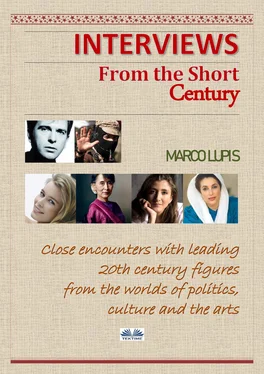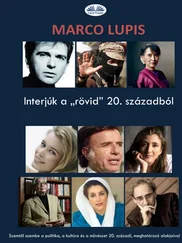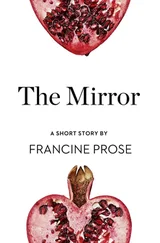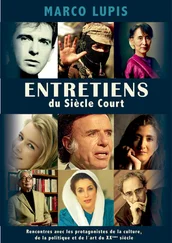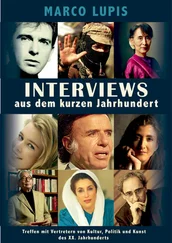Marco Lupis - Interviews From The Short Century
Здесь есть возможность читать онлайн «Marco Lupis - Interviews From The Short Century» — ознакомительный отрывок электронной книги совершенно бесплатно, а после прочтения отрывка купить полную версию. В некоторых случаях можно слушать аудио, скачать через торрент в формате fb2 и присутствует краткое содержание. ISBN: , Жанр: foreign_edu, Биографии и Мемуары, на английском языке. Описание произведения, (предисловие) а так же отзывы посетителей доступны на портале библиотеки ЛибКат.
- Название:Interviews From The Short Century
- Автор:
- Жанр:
- Год:неизвестен
- ISBN:978-8-87-304360-7
- Рейтинг книги:5 / 5. Голосов: 1
-
Избранное:Добавить в избранное
- Отзывы:
-
Ваша оценка:
- 100
- 1
- 2
- 3
- 4
- 5
Interviews From The Short Century: краткое содержание, описание и аннотация
Предлагаем к чтению аннотацию, описание, краткое содержание или предисловие (зависит от того, что написал сам автор книги «Interviews From The Short Century»). Если вы не нашли необходимую информацию о книге — напишите в комментариях, мы постараемся отыскать её.
Interviews From The Short Century — читать онлайн ознакомительный отрывок
Ниже представлен текст книги, разбитый по страницам. Система сохранения места последней прочитанной страницы, позволяет с удобством читать онлайн бесплатно книгу «Interviews From The Short Century», без необходимости каждый раз заново искать на чём Вы остановились. Поставьте закладку, и сможете в любой момент перейти на страницу, на которой закончили чтение.
Интервал:
Закладка:
Alberto and I really wanted to make a difference. Whereas today's kids are engrossed in selfies, Instagram and smartphones, we poured our boundless enthusiasm and utterly carefree attitude into reading everything in sight and going to concerts, music festivals (it was that magical time when rock music was really taking off) and film clubs.
And so it was, armed with a dictaphone and our heads full of dreams, we made our way hurriedly towards the San Babila theatre on that sunny October afternoon more than forty years ago.
Our appointment was at 4pm, an hour before the matinée performance was due to begin. We were led down to the basement of the theatre, where the actors had their dressing rooms, and waiting for us in one of them was the star of the show and my first interviewee: Peppino De Filippo.
I don't remember much about the interview, and unfortunately the recordings of our radio show must have got lost during one of my many moves.
What I can still remember clear as day is the buzz, that frisson of nervous energy that I felt â and would feel plenty more times in my life â before the interview began. I say interview, but really I see an interview as a meeting ; it's a lot more than just a series of questions and answers.
Peppino De Filippo was coming to the end â he died just a few years later â of what was already a legendary career acting on stage and screen. He greeted us without getting up from his seat in front of the mirror, where he was doing his make-up. He was kind, courteous and engaging, and he pretended not to be taken aback when he found himself confronted with a couple of spotty teenagers. I remember the calm, methodical way in which he laid out his stage make-up, which looked heavy, thick and very bright. But the one thing that really sticks in my mind is the profound look of sadness in his eyes. It hit me hard because I felt his sadness so intensely. Perhaps he knew that his life was drawing to a close, or maybe it was proof of the old theory about comedians: they might make everybody else laugh, but they are themselves the saddest people in the world.
We spoke about the theatre and about his brother Eduardo, naturally. He told us how he had born into show business, always travelling around with the family company.
When we left after nearly an hour in his company, we had a full tape and felt a little fuzzy-headed.
That wasn't just my first interview; it was the moment I realised that being a journalist was the only career choice for me. It was the moment I felt for the first time that strange, almost magical chemistry between and interviewer and their subject.
An interview can be a formula to get to the truth, or it can be a futile exercise in vanity. An interview is also a potent weapon, because the journalist can decide whether to work on behalf of the interviewee or the reader.
In my opinion, there is so much more to an interview. Itâs all about psychoanalysis, a battle of minds between the interviewer and the interviewee.
In one of the interviews you will read in this book, José Luis de Vilallonga puts it very nicely: âIt's all about finding that sweet spot where the interviewer stops being a journalist and instead becomes a friend, someone you can really open up to. Things you wouldn't normally dream of telling a journalist.â
An interview is the practical application of the Socratic art of maieutics: the journalistâs ability to extract honesty from their subject, get them to lower their guard, surprise them with a particular line of questioning that removes any filters from their answers.
The magic doesn't always happen; but when it does, you can be sure that the interview will be a success and not just a sterile question-and-answer session or an exercise in vanity for a journalist motivated solely by a possible scoop.
In over thirty years as a journalist, I have interviewed celebrities, heads of state, prime ministers, religious leaders and politicians, but I have to admit that they're not the ones towards whom I have felt genuine empathy.
Because of my cultural and family background, I ought to have felt on their side, on the side of those men and women who were in power, who had the power to decide the fate of millions of people and often whether they would live or die. Sometimes the destiny of entire populations lay in their hands.
But it never happened like that. I only felt true empathy, that closeness and that frisson of nervous energy when I interviewed the rebels, the fighters, those who proved they were willing to put their (often peaceful and comfortable) lives on the line to defend their ideals.
Whether they were a revolutionary leader in a balaclava, hiding out in a shack in the middle of the Mexican jungle, or a brave Chilean mother waging a stubborn but dignified fight to learn the horrible truth about what happened to her sons, who disappeared during the time of General Pinochet.
It seems to me as though these are the people with the real power.
Grotteria, August 2017
*****
The interviews I have collated for this book appeared between 1993 and 2006 in the publications I have worked for over the years as a reporter or correspondent, primarily in Latin America and the Far East: the weekly magazines Panorama and LâEspresso , the dailies Il Tempo , Corriere della Sera and La Repubblica , and some for the broadcaster RAI.
I have deliberately left them as they were originally written, sometimes in the traditional question/answer format and sometimes in a more journalistic style.
I have written introductions to each interview to help set the scene.
1
Subcomandante Marcos
We shall overcome! (Eventually)
Hotel Flamboyant, San Cristóbal de las Casas, Chiapas, Mexico. A message has been slipped under my door:
You must leave for The Jungle today.
Be at reception at 19:00.
Bring climbing boots, a blanket,
a rucksack and some tinned food.
I have just an hour and a half to get these few things together. Iâm headed for the heart of the Lacandon Jungle, which lies on the border of Mexico and Guatemala and is one of the least explored areas on Earth. In the present climate, no ordinary tour operator would be willing to take me there; the only man who can is Subcomandante Marcos, and the Lacandon Jungle is his last refuge.
*****
That meeting with Subcomandante Marcos on behalf of Corriere della Sera âs weekly magazine, Sette , remains to this day the proudest moment of my career. Even if I wasnât the first Italian journalist to interview him (I canât be certain that the likeable and ubiquitous Gianni Minà didnât get there first, if Iâm honest), it was definitely long before the fabled insurgent with his trademark black balaclava spent the next few years ferrying the worldâs media to and from his jungle hideaway, which he used as a kind of wartime press office.
It had been nearly two weeks since my plane from Mexico City had touched down at the small military airport in Tuxtla Gutiérrez, the capital of the state of Chiapas, at the end of March. Aeroplanes bearing Mexican Army insignia were taxiing on the runway, and various military vehicles were parked menacingly all around. Chiapas was approximately a third of the size of Italy and home to over three million people, most of whom had Mexican Indian blood: some two hundred and fifty thousand were descended directly from the Maya.
Читать дальшеИнтервал:
Закладка:
Похожие книги на «Interviews From The Short Century»
Представляем Вашему вниманию похожие книги на «Interviews From The Short Century» списком для выбора. Мы отобрали схожую по названию и смыслу литературу в надежде предоставить читателям больше вариантов отыскать новые, интересные, ещё непрочитанные произведения.
Обсуждение, отзывы о книге «Interviews From The Short Century» и просто собственные мнения читателей. Оставьте ваши комментарии, напишите, что Вы думаете о произведении, его смысле или главных героях. Укажите что конкретно понравилось, а что нет, и почему Вы так считаете.
